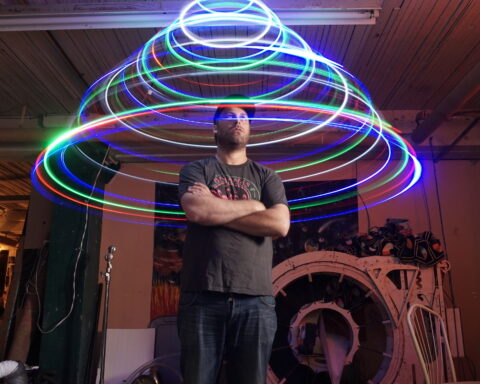When Peter Wintonick died yesterday at the age of 60 in Montreal, the documentary community lost a great friend, a perpetually kind and generous artist who relished the roles of director, producer, film programmer, writer and mentor. He was constantly introducing young filmmakers to established documentarians, often effusively. Daniel Cross, the co-founder of EyeSteel Film (Up the Yangtze, etc) still talks about Peter’s generosity, editing his first feature The Street, essentially for free, just to help a young, sincere filmmaker get his break.
His skills as an editor were exceptional. Nettie Wild, the award-winning BC filmmaker often mentions how important Peter was in her development as a doc-maker with his brilliant editing of her debut feature A Rustling of Leaves.
Peter collaborated with Mark Achbar on Manufacturing Consent and Katerina Cizek on Seeing is Believing. Both went on to great careers, Achbar with The Corporation and Cizek with the brilliant webdocs Highrise and the new A Short History of the Highrise, a NYTimes/NFB co-production.
He loved words and helped to add “docutainment” “doc-maker” and other terms to the filmmaking lexicon. He wrote lengthy articles on documentaries for POV, and Europe’s DOX and many other publications.
Peter loved to travel the world, sowing the seeds of new documentaries wherever he went. You could see him in Iceland, India, Sheffield, Australia—the man was welcome everywhere. He spent much time in China and eventually came up with the idea and co-produced Yung Chang’s follow up to Up the Yangtze, China Heavyweight. He was always at IDFA, Amsterdam’s Documentary Festival, which he helped to raise to legendary status. He relished his role as co-host of “tea time talks” with festival director Ally Derks and had previously produced “talk shows,” which featured doc-makers from around the world talking about their craft.
Peter invited Kat Cizek and me to be his guests when he won the GG Award for Media in 2006. Peter was at his best, quipping and genuinely relishing his role: talking about media and communications with fellow artists and mandarins in Ottawa.
Peter Wintonick was unfailingly funny and was often the life of the party. But I know—and so do his other close friends—that he was “serious fun.” He’d go home and write until 3 in the morning. Or start planning another film. Or quietly help someone younger with his editing skills. The world is a poorer place without him.










